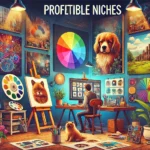How to Create NFTs for Artists: A Beginner’s Guide

The rise of blockchain technology has opened new opportunities for artists to monetize their work through Non-Fungible Tokens (NFTs). NFTs allow artists to sell their digital art in a way that ensures authenticity and ownership while providing a potential revenue stream. Here’s a beginner’s guide to creating and selling NFTs.
1. Understand NFTs
NFTs are digital assets that represent ownership of unique items or content on a blockchain. Key features include:
- Uniqueness: Each NFT has a unique identifier, making it one of a kind.
- Verifiable Ownership: Blockchain technology ensures that ownership is transparent and secure.
- Royalties: Artists can earn royalties on secondary sales of their NFTs.
2. Prepare Your Digital Artwork
Create or select a piece of digital art you want to sell as an NFT. Consider:
- File Formats: Common formats include JPEG, PNG, GIF, MP4, or SVG.
- Quality: Ensure your artwork is high-resolution and well-presented.
- Concept: Think about the story or concept behind your art to attract buyers.
3. Choose a Blockchain
The blockchain you choose will determine where your NFT is stored and sold. Popular options include:
- Ethereum: The most widely used blockchain for NFTs, supporting platforms like OpenSea and Rarible.
- Polygon (MATIC): A low-cost, eco-friendly alternative compatible with Ethereum.
- Tezos: Known for its energy efficiency and affordable transaction fees.
- Solana: Offers fast transaction speeds and low costs.
4. Set Up a Digital Wallet
A digital wallet is required to store cryptocurrency and manage NFTs. Popular wallets include:
- MetaMask: A widely used wallet for Ethereum-based NFTs.
- Coinbase Wallet: User-friendly and integrates with Coinbase Exchange.
- Phantom: Ideal for Solana-based NFTs.
Ensure you securely back up your wallet’s seed phrase to prevent loss of access.
5. Purchase Cryptocurrency
NFT platforms require cryptocurrency to cover transaction fees (also called gas fees). Steps:
- Purchase cryptocurrency like Ethereum or Solana from exchanges such as Coinbase, Binance, or Kraken.
- Transfer the cryptocurrency to your digital wallet.
6. Select an NFT Marketplace
Choose a platform to mint and sell your NFTs. Popular marketplaces include:
- OpenSea: One of the largest NFT marketplaces, supporting various blockchains.
- Rarible: Allows artists to set their own royalties and customize their listings.
- Foundation: A curated platform for high-quality digital art.
- Hic et Nunc: A Tezos-based platform with lower transaction costs.
7. Mint Your NFT
Minting is the process of creating an NFT and uploading it to the blockchain. Steps:
- Connect Your Wallet: Link your wallet to the NFT marketplace.
- Upload Your Artwork: Follow the platform’s instructions to upload your file.
- Add Metadata: Include a title, description, and any unlockable content (e.g., high-res files or bonus content).
- Set Royalties: Specify the percentage you’ll earn on secondary sales.
- Pay Gas Fees: Complete the transaction to mint your NFT.
8. List Your NFT for Sale
Once minted, list your NFT on the marketplace. Options include:
- Fixed Price: Set a specific price for your NFT.
- Auction: Allow buyers to bid, with the highest bidder winning.
- Bundle Sales: Group multiple NFTs together for a single price.
Promote your listing to attract potential buyers.
9. Promote Your NFT
Marketing is crucial for selling NFTs. Strategies include:
- Social Media: Share your work on platforms like Twitter, Instagram, and Discord.
- Collaborations: Partner with other artists or influencers in the NFT space.
- NFT Communities: Join forums and groups like Reddit (NFT subreddits) or Discord servers dedicated to NFTs.
10. Monitor and Engage
Engage with your buyers and followers to build a loyal community. Tips:
- Respond to inquiries promptly.
- Share updates about future NFT drops or projects.
- Thank buyers publicly (if they’re open to it) to encourage repeat purchases.
11. Understand Tax and Legal Implications
NFT earnings are taxable in most jurisdictions. Consider:
- Capital Gains Tax: Applies to cryptocurrency transactions.
- Income Tax: Earnings from NFT sales may be considered income.
- Record Keeping: Maintain detailed records of transactions and fees.
Consult a tax professional to ensure compliance with local regulations.
Conclusion
Creating NFTs offers an exciting opportunity for artists to monetize their digital work and reach a global audience. By understanding the basics of blockchain, selecting the right platforms, and effectively promoting your NFTs, you can establish yourself in this emerging market. Embrace the learning process, experiment with your art, and explore the limitless possibilities of NFTs.

























































































